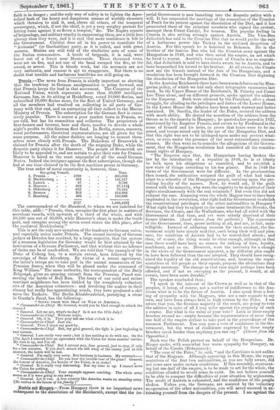Tunas.—The news from Prussia is chiefly important as showing that
the tendency to German amalgamation is going forward, and that Prussia keeps the lead in that movement. The Congress of the National Union, which represents more than 20,000 intelligent Germans, has, in its sitting at Heidelberg, voted 10,000 florins, and subscribed 10,000 florins more, for the fleet of United Germany, and all the members had resolved on collecting in all parts of Ger- many with that end, and on entrusting all they collect to the Marine Ministry of Prussia. The subscription for the German fleet is exces- sively popular. There is scarce a poor market town in Prussia, we are told, but has its committee and collector. The proprietors of beer-houses and taverns, here and there, resolve to devote a whole night's profits to this German fleet fund. In Berlin, torsos, concerts, vocal performances, theatrical representations, are all given for the same purpose. All the minor duchies are longing to cement them- selves more closely with Prussia. The Dukedom of Brunswick is claimed for Prussia after the death of the reigning Duke, while the despotic party claims it for Hanover. The people of Brunswick are likely to be appealed to, and are certain to give their vote for Prussia. Hanover is hated as the most unpopular of all the small German States. Indeed she intrigues against the fleet subscription, though she had at one time claimed to be the first maritime power in Germany. The true order of naval superiority is, however, thus :
Sea-going Vessels. Tons.
1. Prussia . . . 1090 335,000 2. Mecklenburg . . 381 141,417 3. Lubeck . . . 67 9,780 4. Hanover . . . 822 97,1111 5. Oldenburg . . 632 70,434 6. Bremen . . 262 164,892 7. Hamburg . 483 189,888 3737 1,008,4221
The correspondent of the Standard, to whom we are indebted for this table, adds : "Prussia, then, occupies the first place in matters of merchant vessels, with upwards of a third of the whole, and with 10,500 men out of 30,000, while Hanover's share is under the tenth part, and occupies among the seven coast states the fifth place, after the mediaeval Mecklenburg."
This is not the only new symptom of the tendency to German union, and especially union under Prussia. The annual meeting of German judges at Dresden has resolved, by a large majority, that the system of a common legislation for Germany would be best attained by the institution of a German Parliament, and that without this no labours of theirs can be of much effect. We are told that "the example of the Duke of Coburg has, to a certain extent, been followed by the sovereign of Saxe Altenburg. By. virtue of a recent agreement, the latter's troops are to take part in the annual manoeuvres of the Prussian forces, when they will be placed under the command of King William." The same authority, the correspondent of the Daily Telegraph, gives an amusing extract from the Prussian Punch con- cerning the battle of Bull Run. The fancy of our solid and rather martinet neighbours has been tickled by the completely voluntary airs of the American volunteers : and revolving the matter in their clumsy but really fan-appreciating minds, they have produced a skit upon the Yankees. The Berlin Kladderadatsch, parodying a scene iu Goethe's Faust, has the following
" SCENE FROM THE SEAT OF WAR IN AMERICA.
" Commander-in-Chief. Mr. General, would you be kind enough to attack the enemy ?
" General. Let me see, what's to-day? Is it not the 17th July? " Commander-in-Chief Without doubt.
" General. Oh, it is. Then pray:tell me what o'clock it is.
" Commander-in-Chief Just six. " General. Then I must say good-by. " Commander-in-Chief Bat, my good general, the fight is just beginning in real earnest.
" General. I am really very sorry ; but it has nothing to do with me. On the 17th April I entered into an agreement with the Union tor three months' service. My time is up, and I'm off.
Commander-in-Chief. But I entreat you, dear general, just to stay, if only for a few minutes. If you don't attack the left wing of the enemy just at this moment, the battle will be lost.
" General. •I'm really very sorry. But business is business. My contract- " Commander-in-Chief Do you hear the terrible roar of the guns? General, the honour of America, the honour of the Union, is at stake!
" General. It is really very distressing. But my time is up. I cannot serve the Union for nothing.
" Commander-in-Chief Your example appears catching. The whole army seems as if it were going to run away. " General. Let it run. A free country like America wants no standing army. (He retires to the bosom of his family.)"






























 Previous page
Previous page